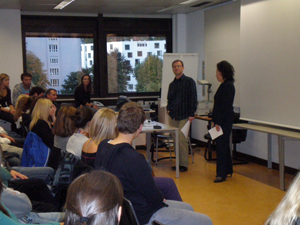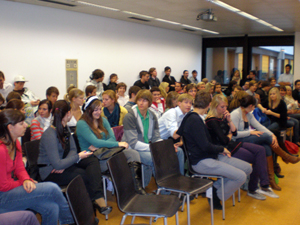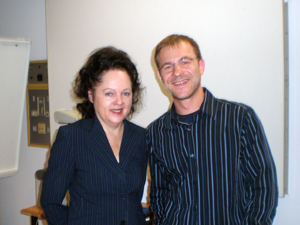American Corner Innsbruck
Lecture by Floo Weißmann
GUANTÁNAMO AND THE PROBLEMS WITH CHANGE
Oct. 16, 2009, 6 p.m., room 50101/1 (Bruno-Sander-Haus, 1st floor)



The American Corner welcomed Floo Weissmann, senior editor of politics at the Tiroler Tageszeitung, who shared his experiences of his visit to Guantánamo Bay detention camp in May 2009 with an audience of eighty people, consisting of high school students, students, English teachers, and university faculty members.
Isolated from the rest of the world by a minefield on one side and the ocean on the other, the facility, which was established in 2002 for the confinement of terrorism suspects, is regarded as a legal vacuum in which neither U.S. law nor the Geneva Conventions apply. These conditions paved the way for a long list of human rights violations such as sleep deprivation, exposure to high temperature, sexual or cultural degradation, the threatening of detainees with weapons, dogs, and insects, or the waterboarding-technique, which simulates a drowning death. While systematic torture seems to have been abandoned long before President Obama took office, the damage wreaked on the reputation of the United States is considerable, and the disconcerting pictures of masked prisoners in orange jumpsuits still haunt the American public.
However, although President Obama promised to shut Guantánamo down within a year and signed the required executive orders already two days into his presidency, he still faces several obstacles. The most problematic of these is the issue of prisoner relocation, because Americans, once told that the inmates at Guantánamo were “the worst of the worst,” are now reluctant to accept the transfer of these detainees to the United States.
After an ample Q&A session, Mr. Weissmann concluded his intriguing talk with a harsh visualization of the already disturbing image he had created in his talk with pictures of thick concrete walls, claustrophobic cells, feeding tubes, and shackles, but also images of the infamous and now derelict Camp X-Ray (a temporary detention facility which was only in operation for the first four months). The grass at this site is waist-high now, and the “bird cages” in which the detainees were held at first are overgrown with climbing plants, giving the impression that the ignominious events at Guantánamo are drifting into oblivion. According to Mr. Weissmann, however, it is unlikely that this issue will soon belong to the past, as the difficulties with change remain.
(text: Andreas Leisner)
Abstract
In May 2009, Floo Weißmann was the first Austrian journalist to visit the Guantanamo Bay Detention Camp located at the Guantanamo Bay U.S. Naval Base in Cuba. This military prison was opened in the aftermath of the September 11, 2001 terrorist attacks on the United States for prisoners captured in the succeeding wars in Afghanistan and Iraq who were believed to be involved in international terrorism. Under the Bush administration, detainees were held captive there indefinitely without trial and disregarding the Geneva Conventions.
The facility came under attack when reports about torture and abuse became public. In 2009, President Obama ordered to close the camp within the year, which has proven to be much more difficult than initially anticipated.
Floo Weißmann will talk about his impressions from the visit at Guantánamo and the problems the current administration is facing in shutting it down.
Floo Weißmann
Floo Weißmann is Senior Editor for Politics at the Tiroler Tageszeitung. Reporting about the USA und US-related issues has become one of his fields of expertise. He is 36 years old and was born in Innsbruck.


